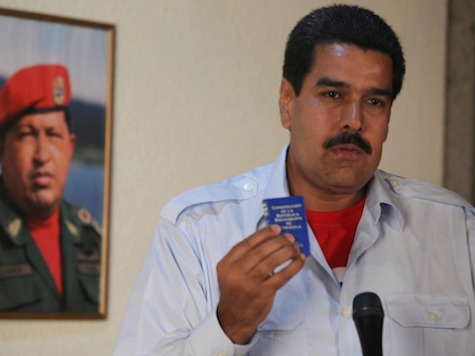As promised in his New York Times column, Venezuelan President Nicolás Maduro has established a “Human Rights Council” responsible for assessing incidents of violent repression of unarmed protesters since the current wave of protests began in February. The committee will be run by senior government officials.
The Council, created by presidential decree (as of November, the main way to pass laws in Venezuela), would consist of fifteen members chosen by Maduro, and would investigate “all incidents” beginning with the arrest of opposition leader Leopoldo López in February. The fifteen members, according to Argentine news outlet Infobae, would be would be Vice President Jorge Arreaza, five unspecified ministers, three yet-to-be-chosen members of human rights NGOs, two members of the National Assembly, Venezuela’s High Commissioner of Peace, Attorney General, Supreme Court Chief Justice and chief public defender.
Maduro announced the new commission shortly after the Union of South American Nations (Unasur) recommended such a commission to handle the serial accusations of police brutality and military attacks on civilians in the country. Maduro has blamed most of the violence in Venezuela on the opposition, arresting multiple members of the opposition party Popular Will for inciting violence.
In actuality, Venezuelan police are estimated to have arrested almost 2,000 individuals since the arrest of López, about one protester every half hour, and most of the survivors of assault have accused members of the Bolivarian National Guard of using their military might to repress protests. Incidents of rape, torture, disfigurement, and other abuses appear in the pages of opposition friendly publications like Infobae and the Spanish newspaper ABC on a daily basis, and videos surface on YouTube and Twitter regularly of attacks on opposition strongholds like the western city of San Cristóbal. Amnesty International has reported dozens of incidents of torture in the past two months.
Due to increased pressure to disassociate with the Venezuelan government, the government of Spain announced today that it will no longer sell riot gear, like helmets and teargas, to Maduro’s regime. El Pais reports that Venezuela is “among the top clients of Spanish industries that manufacture riot materials… in the first quarter of last year… it bought 16.016 Euros of ‘colorants for the manufacture of non-lethal pyrotechnic artifacts’.” This week, Venezuelan officials fired teargas at an opposition Congresswoman unconstitutionally ousted from the National Assembly for appealing to the Organization of American States to intervene in the Venezuelan crisis.
It also notes that the Spanish government is concerned for the wellbeing of Spanish citizens in Venezuela, which number in the hundreds of thousands. One Spanish citizen alleged that Venezuelan authorities raped him with a rifle after being detained in a protest in February.
Adding to the collective voices against the violence inflicted on Venezuelan citizens by Maduro’s government, the head of the Venezuelan Catholic Church fiercely defended the rights of protesters to express themselves freely in a vehement press conference condemning Maduro’s actions yesterday.
Protests continued in San Cristóbal, Táchira today–an opposition stronghold in the west of the nation bordering Colombia–despite Maduro declaring martial law in the region after arresting Mayor Daniel Ceballos. Ceballos is currently serving a one-year sentence for “failing to prevent violence,” according to the AFP.

COMMENTS
Please let us know if you're having issues with commenting.